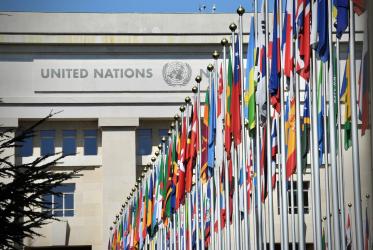Policymakers, programme managers, and service providers — including faith communities — must use more human rights norms and standards to guide a global response to HIV, said a statement submitted by the Ecumenical Advocacy Alliance, an ecumenical initiative of the World Council of Churches (WCC), to the Human Rights Council on 11 March in Geneva.
The statement, delivered to a Thematic Panel Discussion on HIV/AIDS and Human Rights, will be part of significant input brought to the United Nations General Assembly in preparation for the 2016 HIV/AIDS High-level Meeting in New York in June. At that meeting, a Political Declaration will be approved.
“We call attention to the fact that, while the importance of bringing HIV and AIDS policies and programmes in line with international human rights law is generally acknowledged, in reality this is rarely carried out,” said the statement. Francesca Merico, HIV campaign coordinator for the WCC-Ecumenical Advocacy Alliance, helped lead the development of the statement.
To ensure “Fast Track” and Sustainable Development Goals targets are met by 2030 — to guarantee zero new HIV infections in babies; zero deaths among children and adults; and zero stigma and discrimination — the WCC urged a commitment within the UN’s new Political Declaration to four human rights-related areas.
The declaration should:
Address the root causes of vulnerability to HIV. A global response to HIV should place the leadership of people living with and most affected by HIV at the centre of the global response. Key to this response is “partnering with civil society organizations, including faith-based organizations, to understand and address all barriers (legal, economic, social and cultural) that sustain and enforce injustices that contribute to the spread of HIV, including stigma, discrimination, homophobia and gender inequality,” reads the WCC statement.
Achieve universal access to HIV prevention, treatment, care and support. No one should be left behind in achieving the “Fast Track” targets: 95% of people living with HIV knowing their status; 95% of people who know their status on treatment; and 95% of people on treatment with suppressed viral load; with fewer than 200 000 people newly infected with HIV; fewer than 200,000 people dying from AIDS-related causes; and elimination of HIV-related stigma and discrimination.
Eliminate stigma and discrimination. The declaration should commit to eliminating HIV-related stigma and discrimination among service providers in healthcare, workplace and educational settings, including through trainings and evidence-based effective interventions.
Ensure an independent accountability mechanism to monitor the implementation of the Political Declaration. The declaration should commit to a clear accountability mechanism that builds on previous monitoring systems.
The panel, comprised of experts and representatives of affected populations, reviewed the progress achieved in addressing human rights issues in the context of efforts to end the epidemic of AIDS by 2030, including successes, best practices and lessons learned. The thematic panel, held for three hours, was opened and presided by the president of the Human Rights Council. The High Commissioner for Human Rights delivered an opening statement.
More information on the Ecumenical Advocacy Alliance
Full text of statement from the WCC-EAA at the Human Rights Council (11 March 2016)







